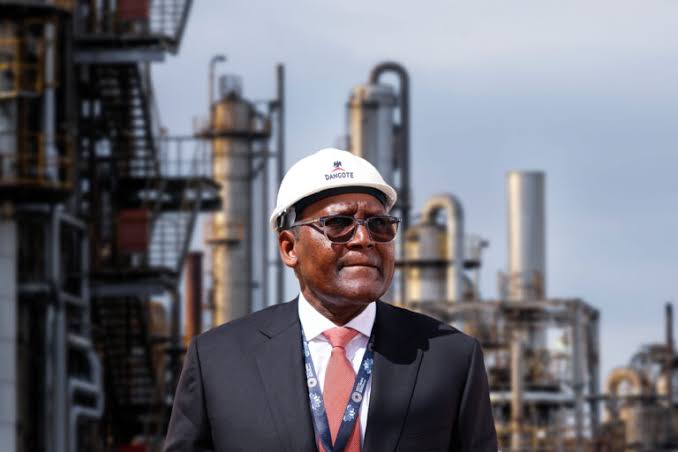Breaking News
BREAKING: Ghana to import petroleum from Dangote Refinery – Official

According to Ghana’s National Petroleum Authority, the country wants to increase its energy security and maintain commercial ties with its neighbors by importing refined petroleum products from Dangote Refinery.
This was said by Dr. Mustapha Abdul-Hamid, the CEO of NPAG, during the 2024 OTL Africa Downstream Energy Week in Lagos on Tuesday.
Speaking as a panelist, Abdul-Hamids stated that the action was intended to improve regional economic cooperation and bolster Ghana’s energy security.
According to the News Agency of Nigeria (NAN), “Alliances for Growth” is the subject for the 18th edition of the 2024 OTL.
According to Abdul-Hamid, Ghana is seeking an agreement with Dangote Refinery, and reducing its reliance on more costly imports from Rotterdam.
He said that Ghana had also expanded its export agreements to include Burkina Faso, Mali, and Niger, supplying international operational facilities, including U.S. military bases.
“The Dangote Refinery, with its large-scale output, is expected to meet Nigeria’s domestic demand, enabling excess production to be exported to Ghana,” he said.
Abdul-Hamid highlighted Ghana’s pipeline agreement with Burkina Faso as a model of effective regional cooperation to bolster petroleum supply and security, while calling for stronger regional partnerships.
He stressed the importance of a unified currency, enhanced infrastructure, and collaborative efforts to address West Africa’s energy challenges.
The chief executive officer called for resource-sharing to drive economic stability, noting that no African nation could achieve sustainable growth in isolation.
“Pooling human and infrastructure resources across the region can significantly strengthen our economies,” he said.
He suggested that West African nations aligned regulatory policies within the ECOWAS framework to foster seamless trade.
Abdul-Hamid acknowledged that, while the African Continental Free Trade Area (AfCFTA) provided a platform for collaboration, foreign exchange (FX) issues hindered intra-regional trade.
“Heavy reliance on the U.S. dollar for petroleum imports places constant pressure on local currencies, raising prices and reducing purchasing power,” he explained.
He proposed a common West African currency to reduce FX volatility and stabilise regional economies.
On regional economic stability through shared infrastructure, Abdul-Hamid emphasised the need for unified investments in infrastructure to lower transportation costs and improve distribution within the region.
“Transporting petroleum by road is both costly and risky, with hazards such as banditry.
“A shared pipeline infrastructure is safer and more cost-effective,” he said.
Abdul-Hamid cited the Ghana-Burkina Faso pipeline agreement, designed to reduce dependence on tanker transport and ensure consistent supply.
He said that Ghana had introduced regulatory policies that allowed marketers to share storage facilities, promoting cooperation and economic stability.
“This reform supports alliances among importers, enhancing business success and broader economic stability.”
Ms Oluwatosin Aina, Group Head, Energy, First Bank of Nigeria Ltd., also echoed Abdul-Hamid’s call for a unified African currency.
Aina noted that dollar-based transactions inflated operational and product costs across the continent.
She explained that petroleum transactions with Dangote Refinery and Ghana’s Sentuo Oil Refinery must be dollar-based, “as no African refinery will sell Premium Motor Spirit (PMS) in local currencies.”
The group head said that the end of Nigeria’s fuel subsidy had created new investment opportunities in downstream and midstream sectors, making it easier for banks to fund petroleum imports.
She, however, noted that dollar-denominated transactions continued to strain the naira and other regional currencies, calling for strengthened non-oil exports to improve FX inflows.
Aina suggested a model based on the European Union’s common currency, the euro, to stabilise African markets.
“Francophone African countries benefit from stable exchange rates under their shared currency, making them less vulnerable to FX volatility.
“Anglophone nations could adopt a similar approach to strengthen trade and financial stability,” she said.
Abdul-Hamid and Aina stressed the urgent need for a unified infrastructure and currency reforms.
They said that by aligning fiscal policies, petroleum infrastructure, and regulatory frameworks, West African nations could address currency challenges and ensure affordable, stable petroleum pricing for citizens.










